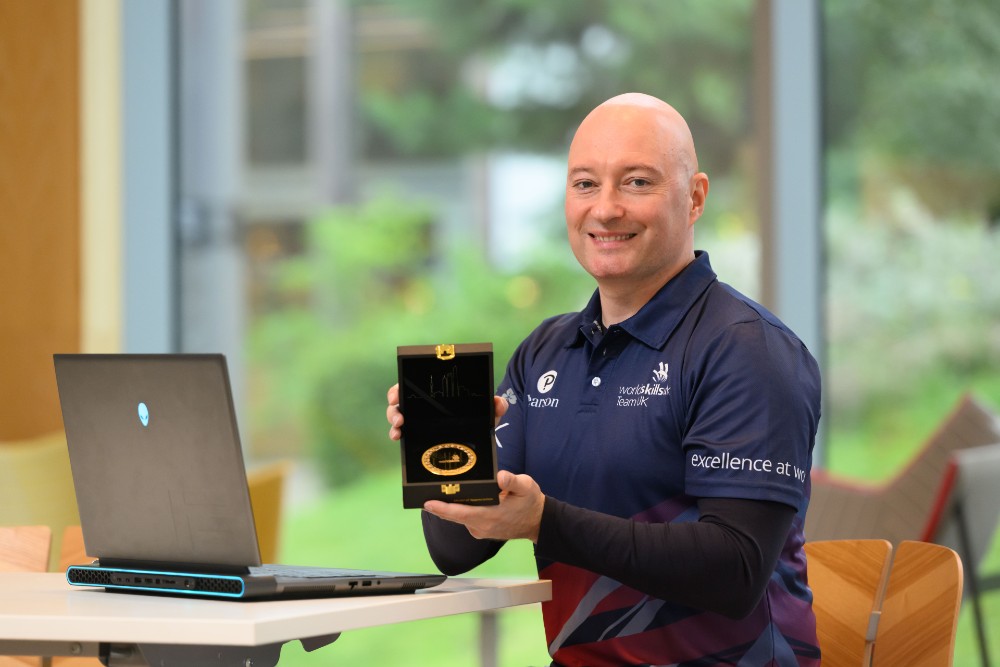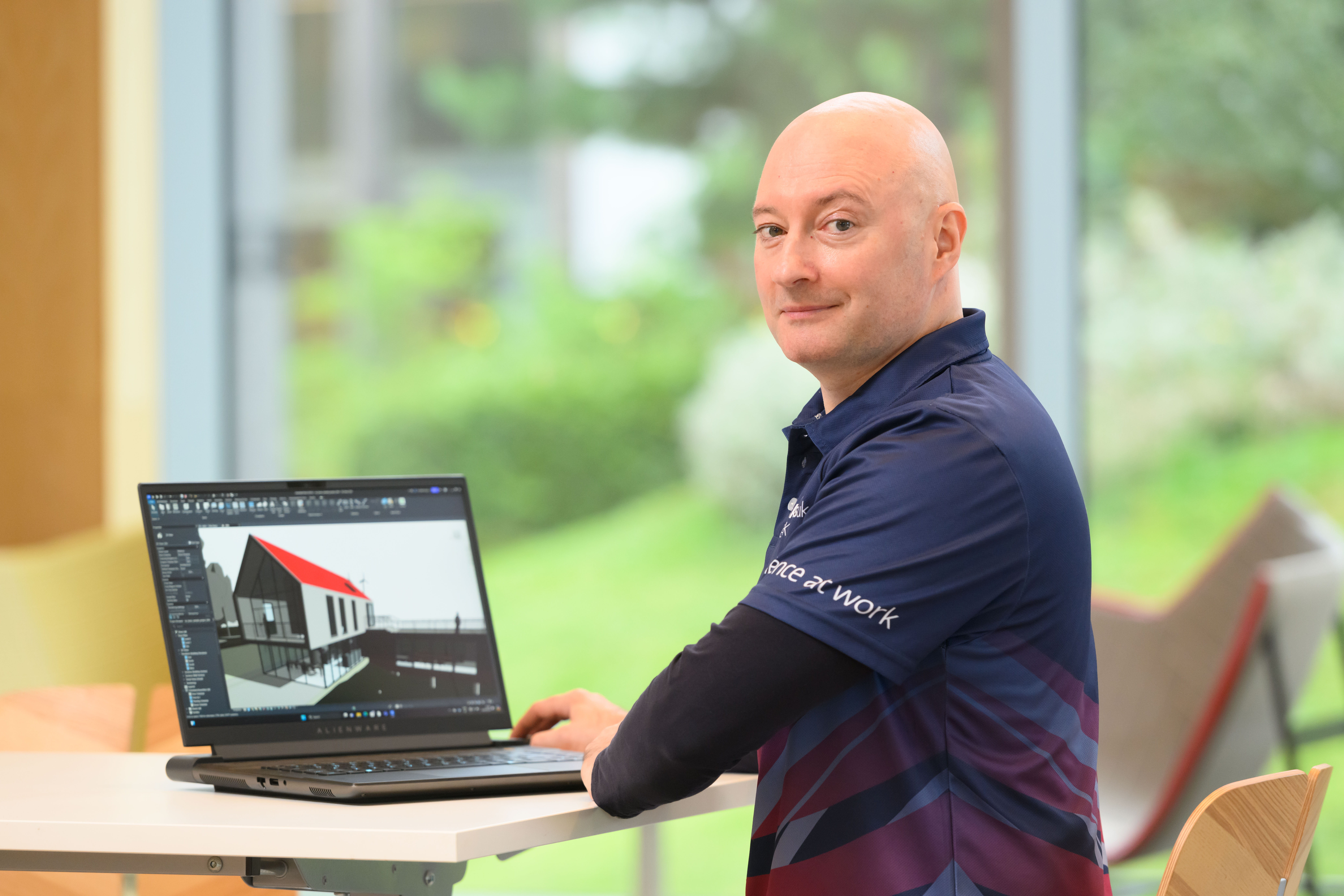WorldSkills a prime example of incentivised learning, says academic

France played host to the Paris Olympic Games this summer and, in September, the country will be the home of the ‘Skills Olympics’ too.
WorldSkills 2024 will be held in Lyon from September 10-15 and will host more than 1,500 young people from 65 countries, competing in 62 different skill disciplines. Informally referred to as the ‘Skills Olympics’, the event will see two Glasgow Caledonian students take part as well as a member of the University’s academic staff.
Students Finley Graham and Yasmin George will showcase their remarkable talents on the international stage, competing alongside the world’s best in their respective skill categories. Finley will compete in the highly competitive IT Network Systems Administration category. Yasmin will showcase her exceptional skills in 3D Digital Game Art.
Michael McGuire, a lecturer in Digital Construction at Glasgow Caledonian, has also been heavily involved in the process, designing the curriculum for his skill area and overseeing the competition.
Michael says he has been using incentives to motivate students for more than a decade, developing a teaching approach that blends traditional methods such as feedback and formative assessment with incentives and modern techniques to push students to excel.
“It all started with a simple idea: offering a Freddo chocolate bar as a reward for the first student to finish a task or perform the best in class,” he said. “This small prize sparked friendly competition and increased student engagement.”
Over time, Michael expanded on this idea. He noticed that while a chocolate bar could keep students focused for a short period, bigger rewards encouraged them to practice more. However, it eventually became less about the prizes and more about students wanting to master the skills themselves.
“I previously developed a learning system that combined self-directed study with immediate feedback,” he said. “The system used a gamification approach, giving students instant feedback on their progress. If they did well, they could move on to the next section; if not, they quickly learned where they went wrong and how to improve.
“WorldSkills is very similar to this. It’s like the Olympics for early career professionals and apprentices. Talented young people from around the world come together to compete in their disciplines. Instead of all competing in the same sport, they compete in the same skill discipline.”
WorldSkills is an international charity that organises world, continental and national championships for vocational skills, held every two years in different parts of the world, and also hosts conferences focusing on vocational skills. It spans a wide array of fields, reflecting the diverse talents required in today’s workforce − from cutting-edge digital skills such as IT network systems and 3D game art to essential crafts such as aircraft maintenance and fashion design. Each skill area is carefully chosen to ensure that the competition remains relevant to modern industry demands, and to provide a platform for the next generation of professionals to shine.
As the UK Training Manager for built environment and digital construction disciplines, Michael identifies students who show exceptional commitment and guides them through a rigorous two-year training programme. He has been mentoring at a UK and European level since 2018, and, last year, he coached Sheffield Hallam digital construction student Isabelle Barron to gold at the EuroSkills competition, held in Gdańsk, Poland.
His work doesn’t stop at national and continental competitions; internationally, Michael was elected Chief Expert for the 2022-2024 cycle, a role that places him at the forefront of the competition’s assessment and judging processes. “We ensure that competition standards are upheld, the tasks are fair, and that all competitors are evaluated consistently,” he said.
The preparation for WorldSkills is anything but glamorous. While Michael’s social media might showcase international travel, the reality involves long hours of training, often on evenings and weekends. “We train a minimum of one weekend per month, working until late, usually 11pm,” he shared. “This dedication is mirrored by the students, who balance their day jobs with intense training sessions that focus on improving speed, efficiency, and problem-solving skills.”
The benefits of participating in WorldSkills are profound. “It significantly boosts participants’ future careers by providing them with a prestigious platform to demonstrate their skills on a global stage,” Michael explained. “The competition not only enhances technical skills but also builds resilience, adaptability, and confidence − qualities highly valued in any profession.”
The atmosphere at WorldSkills is described as a unique blend of excitement, pressure, and camaraderie. Competitors, while driven to excel, often form lasting friendships with peers from around the world. “They make the best of friends,” Michael said.
One of the competition’s most challenging aspects is the secret test project − tasks revealed only on the day, designed to reflect the latest industry standards. “The process builds self-confidence as competitors see the tangible results of their hard work,” Michael said.
Looking ahead, Michael envisions WorldSkills as more than just a competition. “It’s a movement that raises the standards of vocational education and training globally,” he said. “For students and young professionals, WorldSkills offers more than just a chance to compete − it’s an opportunity to excel, grow, and make a mark on the world stage. More and more, governments are looking for academic institutions to produce graduates with skills that directly benefit the economy. The fact that Glasgow Caledonian University is involved in WorldSkills reflects the institution’s ethos to produce these industry-ready graduates.”

